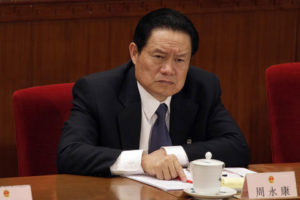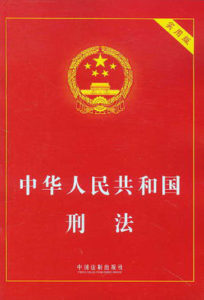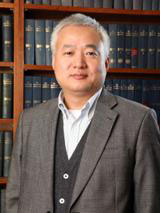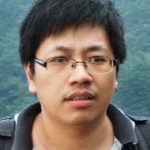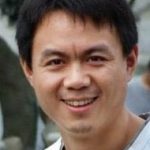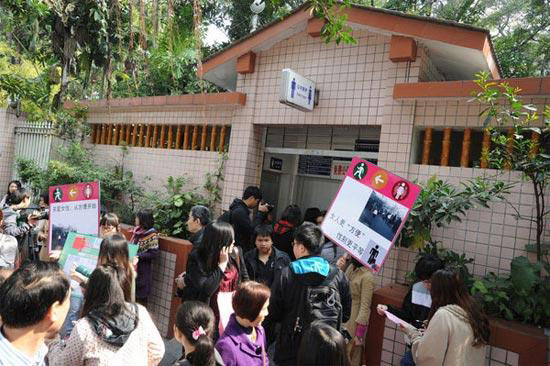
According to the multilingual animated music video, The Four Comprehensives, ‘the rule of law is guaranteed’
Photo: thenanfang.com
During his three years at the helm, Xi Jinping has championed a particular notion of the ‘rule of law’. The October 2014 Resolution of the Fourth Plenum of the Eighteenth Party Congress articulated a grand plan for political and social stability that made ‘ruling the nation according to the law’ 依法治国 the Chinese government’s top priority. In late December that year, the Party declared ‘ruling the nation according to the law’ one of the ‘Four Comprehensives’ 四个全面 that constitute Xi’s chief contribution to political theory.
To understand what the rule of law actually means, we need to look closely at the October 2014 Resolution, because it states that Party lead-ership and the rule of law are identical. It also describes the rule of law as integrating two ancient traditions of law and governance: the Legalist tradition of ‘ruling the nation according to the law’ with the Confucian principle of ‘ruling the nation by morality’ 以德治国. The latter associates political order with the moral authority of a nation’s leaders. The interests of a morally upright leadership are identical to those of the people they govern—and so, by this logic, the law can and should be used to sustain the power of the ruling (Communist) party. Hence, the rule of law can be understood to mean Party-Rule-Through-Law.
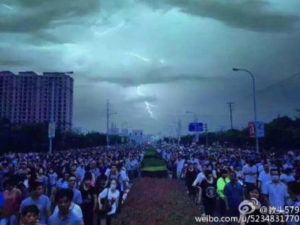
29 June 2015: A ‘mass incident’ in Jinshan district, Shanghai. Thousands of protestors gathered to protest against the construction of a chemical plant
Photo: Twitter
Given China’s increasingly heterogeneous society, in which people may find their needs and interests at odds with those of the Party, the rule of law serves the practical function of controlling dissent as well. As we have written in previous China Story Yearbooks, over the last fifteen years or more, there have been many tens of thousands of public protests annually against corruption and abuses of power—what the Party calls ‘mass incidents’. President Hu Jintao and Premier Wen Jiabao responded to such unrest by mounting campaigns to ‘maintain stability’: policing and judicial measures known as ‘stability maintenance’. Now, with his rule of law agenda, Xi Jinping has put ‘stability maintenance’ on steroids.
Pruning the Political Tree
For two years, Xi’s anti-corruption campaign has targeted party officials accused of moral and/or material corruption. Xi has wielded the rule of law—in this case the Party’s internal disciplinary rules—like a blade with which to prune the unruly branches at the top of the political tree. These ‘branches’ include mid-ranking party officials as well as higher-ups in Beijing whom he considers a potential threat to his leadership; not all the corrupt officials are targeted. Still, with at least one senior official in every province under arrest, this campaign has turned into the most comprehensive attack on graft since the Cultural Revolution.
In 2015, its focus turned to the business sector, including some of China’s biggest corporations: CNP, Sinopec, and Chinalco. The Washington-based Eurasia Group, the world’s largest consultancy specialising in political risk, suggests that in 2015, no less than eighty-three Chinese entities—including state-owned enterprises (SOEs), and institutions such as the China Securities Regulatory Commission—have fallen under investigation, compared with twenty in 2013 when the campaign began.
The ‘leniency’ of the suspended death sentence handed to Zhou Yongkang 周永康 in June 2015 was read by some analysts as signalling that the campaign was winding down. Zhou, the former secretary of the Central Political and Legal Affairs Commission, was the most senior political figure in decades to be expelled from the Party and charged with capital offences—in his case bribery and abuse of power. The suspended death sentence may eventually be commuted to a long custodial sentence. With many observers expecting that Zhou would face immediate execution, the lighter punishment appeared to be a message that Xi was prepared to end the anti-corruption campaign before it could seriously threaten powerful figures, particularly within the military, who might have gone down fighting.
The campaign continues to target corrupt officials who have fled the country. Since April 2015, five government departments—the People’s Bank of China, the Ministry of Public Security, the Supreme People’s Court, the Supreme People’s Procuratorate, and the State Administration of Foreign Exchange—have worked jointly to track down fugitive officials and their illicit assets.
Criminalising Unruliness
The 2015 Amendment to the 1997 Criminal Law, passed in August, listed nine types of crimes that will no longer be subject to the death penalty. Smuggling weapons or ammunition, smuggling nuclear materials, smuggling counterfeit money, counterfeiting, investment fraud and fraudulent fundraising, organising prostitution, forcing females into prostitution, obstructing military affairs, and spreading rumours, and undermining morale during wartime are no longer punishable by death. This brings down the number of capital crimes in
China to a total of forty-three. The revised Criminal Law also extends protection to some of society’s more vulnerable or previously ignored groups. New criminal offences include rape committed against males, the purchase of children even if there is no evidence of abuse, and actions by guardians and caretakers that harm those under their care.
The Criminal Law has introduced twenty new criminal offences and the amendment has increased the seriousness of selected other offences. Among the newly listed crimes are contempt of court as evidenced by ‘insulting a judge’, ‘disrupting court orders’, ‘reporting or revealing information about cases not made public’, and even bringing a civil case that is based on ‘a distorted version of the truth’. In addition, the law targets forms of dissent including ‘fabricating or deliberately transmitting false information’ online, ‘forcing someone to wear extremist clothing or tokens’, ‘disrupting the work of public bodies’, and ‘organising or aiding illegal gatherings.’ The new crime of ‘forcing someone to wear extremist clothing or tokens’ appears to be aimed at discouraging Uyghur men and women in Xinjiang from wearing clothing such as the hijab, or Muslim headscarf that expresses devotion to their faith.

25 June 2015: Xi Jinping and Li Keqiang shake hands with groups and individuals being honoured for their contributions to the country’s antidrug campaign in Beijing
Photo: news.cn
Resurrecting Mao
The rule of law agenda makes use of the revolutionary language of the ‘mass line’ and ‘political struggle’ 斗争. By drawing on what Qian Gang 钱钢 at the China Media Project in Hong Kong, calls ‘deep red’ Maoist discourse, Xi Jinping is signalling that he expects local authorities across the nation to crack down hard on certain types of criminals and (criminalised) dissenters who are characterised as ‘enemies of the people’.
For example, speaking at the start of a new ‘People’s War on Drugs’ campaign launched on 26 June 2015, Xi Jinping used classic Maoist language: ‘We will not recall our army until we have achieved total victory’ 不获全胜绝不收兵. Another Maoist slogan, ‘strengthening the democratic dictatorship of the people’ 加强人民民主专政 was displayed on a banner at a sentencing rally to publicly shame drug offenders before an audience of primary school children. In the post-Mao era it has been almost unheard of to conduct rallies in schools. But this is what happened on 26 June in Dingan county in Tianjin, where offenders convicted of trafficking relatively small amounts of drugs (ten grams of heroin) were sentenced to eight years imprisonment in front of young children.
Xi also followed Mao’s example when he issued a special pardon to a limited group of imprisoned criminals to mark the seventieth anniversary of the end of World War II. Those he pardoned included those who had fought in the War Against the Japanese Occupation, for the Communist Party during China’s civil war or who had served in the People’s Liberation Army in other wars. They also included those who were disabled, over seventy-five years old or who were under eighteen when they committed the crime. This pardon was only the eighth since the founding of the PRC; Mao was responsible for the first seven. So while more optimistic commentators saw in the amnesty a positive development towards the realisation of human rights and the rule of law, others interpreted it as display of extreme confidence and power on the part of Xi.
In September 2015, Xi Jinping declared that ‘Communism is not ethereal and unattainable’ but the very goal towards which the Party should be working. Reaffirming the end-game of Communism after thirty-eight years of silence on the issue is part of Xi’s plan to revive the ‘Party’s nature’ 党性. In this context, applying the rule of the law—including to the Party itself through new Party disciplinary rules 中国共产党纪录处分条例 announced in November 2015—is one of the means by which Xi plans to realise Communism. The use of the expression ‘improper discussion of [the policies] of the Central Party’ 妄议中央 that appears in Article 46 of the rules has raised some eyebrows within the Party as it further institutionalises intolerance of internal political dissent.
Legislating for Stability Over Society
In April 2015, the National People’s Congress released the second draft of a new law on Managing Foreign Non-Governmental Organisations (NGOs). It establishes procedures for foreign organisations to formally register with the government and conduct activities within China. It also puts NGOs under the supervision of public security departments within the State Council and imposes restrictions on Chinese NGOs that receive money from overseas.
International NGOs and representatives of other foreign bodies with interests in or ongoing exchanges with Chinese counterparts, including universities, professional organisations, and business groups, submitted letters to the National People’s Congress expressing grave concern about these provisions, as well as suggestions for amendments. They worry that the ambiguously-worded law, which fails to provide clear definitions of non-profit activities, could jeopardise many kinds of foreign operations within China, including those of universities and think tanks involved in academic and cultural exchanges.
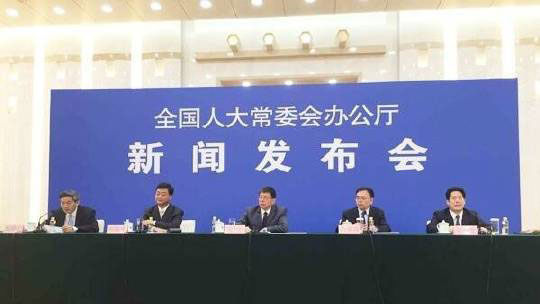
Chinese officials answer questions about a new law regulating foreign NGOs during a press conference at the Great Hall of the People in Beijing
Photo: Weibo
Another controversial law, passed on 1 July 2015, is the National Security Law (see Information Window ‘The National Security Law and The Counterterrorism Law’, pp.72–73). In the view of Professor Fu Hualing 傅華伶 of the University of Hong Kong, what is most significant about the new law is that it shifts the focus from punishment to prevention in such a way that justifies even more pervasive surveillance, particularly over people’s expressed opinions on the basis of safeguarding the country’s ‘core interests’ 核心利益. As defined in Article 2 of the new law, these are: maintenance of the political system under the rule of the Communist Party, the defence of national sovereignty and territorial integrity, and economic development.
In its preamble, the law states baldly that safeguarding the political regime ranks above sovereignty, national unification, territorial integrity, and the people’s welfare. The implication is that any activities alleged to endanger the rule of the Communist Party may now be interpreted as a threat to national security. Vague wording makes it easier for the
party-state to act against its internal and external ‘enemies’ on issues ranging from cultural and ideological heterodoxy to cybersecurity and even China’s interests in space.
Pruning Other Parts of the Tree
As suggested above, the Party central leadership is extending what it calls the ‘struggle’ from crime to political dissent in general. David Bandurski from the China Media Project has quoted from a full–page People’s Daily article in February: ‘China cannot and must not … slavishly copy the systems of the West. Such copying is a means proposed by unspecified ‘hostile forces’ that hope to upset the ‘leadership of the Chinese Communist Party’.
Not surprisingly, 2015 was a particularly bad year for civil society and human rights activism. The authorities have moved strongly to suppress public expressions of dissent, including those that fall within the legal or constitutional rights of Chinese citizens. Lawyers, labour activists, and people working for NGOs have all felt the heat, and there were hundreds of arrests of lawyers over several months in the summer of 2015 alone.
The year began with a series of arrests and detention of a number of prominent civil society activists. Among the first prominent victims of the campaign against local NGOs and civil society activism was Guo Yushan 郭玉闪, a Chinese scholar and the founder of the well-known think tank Transition Institute 传知行. Guo had helped the blind rights activist Chen Guangcheng 陈光诚 escape from house arrest in 2012 and had expressed support for the pro-democracy movement in Hong Kong. He was first detained in October 2014. In May 2015, the Beijing Public Security Bureau recommended that the procuratorate indict Guo Yushan and his colleague He Zhengjun 何正军 for ‘illegal business operations’, following a pattern by which the Party-state, rather than directly accusing someone of ‘thought crimes’ and leaving itself open to the accusation that China has political prisoners, finds some dubious crime to pin on the accused, one that may be difficult to defend and which has the additional benefit of smearing their public reputation. In September, just ahead of Xi’s visit to the US, Guo and He were released on bail, a gesture seen by many observers as a way of smoothing Xi’s path in the US by pre-empting complaints about human rights violations.
But Guo was far from the only case that drew the attention of human rights advocates in 2015. Just days before International Women’s Day on 8 March, public security forces detained five feminist activists in connection with anti-sexual harrassment demonstrations they were planning. The five women had led a campaign in 2012 to ‘occupy’ men’s toilets in an effort to persuade the government to build more public loos for women. Police had warned the women that further activism could get them into trouble. Their arrest in March made them a popular cause among human rights advocates at home and abroad, who used the Twitter hashtag #FreeTheFive. In early April, Hillary Clinton tweeted that their detention was ‘inexcusable’, and called for their release. On 13 April, the ‘Feminist Five’ were released en masse.
That same month, however, Gao Yu 高瑜, a seventy-one-year-old journalist, was sentenced to seven years in prison for leaking state secrets abroad—in her case, by disclosing a Communist Party directive called ‘Document No. 9’ to the Minjing News, an overseas news media group (see the China Story Yearbook 2014: Shared Destiny, p.319 and p.334). The document laid out the Party’s plans to quash liberal political ideas and values.
While past years have seen numerous arrests and harassment of lawyers who defend people’s rights 维权律师, the scale and ferocity of the attacks on this group in 2015 were unprecedented. The crackdown began on 9 July 2015 with the seizures of lawyers Zhou Shifeng 周世锋 and Wang Yu 王宇 and other staff of the Beijing Fengrui Law Firm 北京锋锐律师事务所. During the previous months, members of the law firm, including Wang Yu herself, had been involved in a number of cases deemed sensitive by the government, including a case in Heilongjiang of a petitioner shot dead by the police and the case of the ‘Jiangxi 4’, where four villagers had been wrongly convicted of a double murder in 2000. Involvement in these cases and in other prominent cases in the previous years—the defence of Falun Gong practitioners, of journalist Cao Shunli 曹顺利, and of the Uyghur professor Ilham Tohti 伊力哈木·土赫提—made Wang Yu an easy target. Without exception, those who spoke out and defended Zhou or Wang have been harassed or detained. In the case of the law firm headed by Li Heping 李和平, everyone, including Li Heping’s brother, lawyer Li Chunfu 李春富, has disappeared without trace.
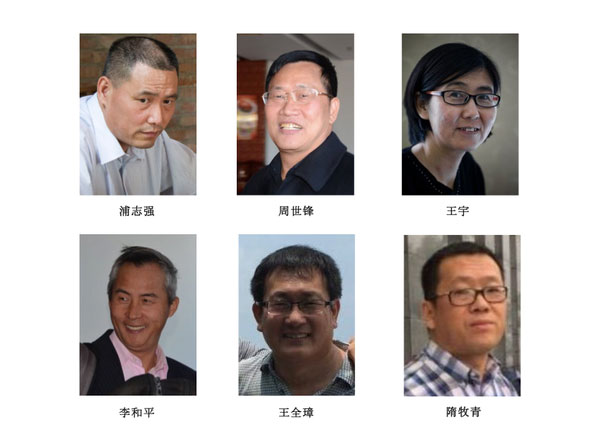
Arrested lawyers: (from top left) Pu Zhiqiang, Zhou Shifeng, Wang Yu (from bottom left) Li Heping, Wang Quanzhang, Sui Muqing
Photo: molihuazh.blogspot.com
During July and August, public security officers took into custody more than 250 lawyers and professional legal staff, interrogating them about both their own activities and those of their colleagues. A number of lawyers were kept in police custody for extended periods; others were placed under ‘residential surveillance at a fixed location’ 指定居所监视 without access to their own lawyers. While some were released within days or months according to the terms of the law, others have been charged with the crime of ‘picking quarrels and provoking troubles’ 寻衅滋事罪 or ‘endangering state security’ 危害国家安全罪.
To support the campaign, Chinese official media published articles outlining the threats that such lawyers allegedly posed to social stability. In the weeks leading up to and following the crackdown, the People’s Daily described human rights lawyers as a dangerous criminal ‘gang’ 圈子 that has been undermining the social order since 2012. The articles resurrect Maoist tactics of public shaming to justify repression against alleged dissenters. As of 11 December 2015, twenty-five lawyers and their associates remained under ‘residential surveillance at a fixed location’, the majority held in unknown locations without the ability to access either legal advice or make contact with their families.
Police also harassed the lawyers’ families and peers. They repeatedly interrogated Wang Yu’s sixteen-year-old son and confiscated his passport. In October, the boy crossed the border into Myanmar, but was arrested there and taken back to China, where he was put under house arrest. Many lawyers and activists have been prevented from leaving the country under the pretext that their going abroad would endanger the security of the state or the like. At the same time, China arranged for the deportation back to the country from Thailand of two veteran Chinese dissidents, who were registered as refugees there, in a covert security operation that involved co-operation between the two countries in violation of international legal standards.
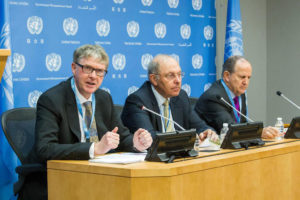
Middle: the Chairperson of the UN Committee against Torture, Claudio Grossman
Photo: UN photo/Loey Felipe
‘Picking quarrels and provoking troubles’ is the official phrase used to criminalise dissent. In November 2014, lawyer and human rights activist Guo Feixiong 郭飞雄, arrested in August 2013 on suspicion of ‘gathering crowds’ was tried, convicted, and sentenced to six years in prison. To the surprise of Guo and his defence team and in violation of procedural rules, the judge announced during the trial that ‘picking quarrels’ had been added to the initial charge, which resulted in the addition of two more years of imprisonment to the original sentence of four years. In December, the Beijing Second Intermediate People’s Court found lawyer Pu Zhiqiang 浦志强, one of the most outspoken of the human rights lawyers of the group detained in May the previous year (see the China Story Yearbook 2014: Shared Destiny, p.265, pp.278–279, p.290, and p.335), guilty of ‘inciting ethnic hatred’ 煽动民族仇恨罪 and ‘picking quarrels and provoking troubles’. They sentenced Pu, who had already been detained for eighteen months, to a three-years ‘suspended’ 缓刑 jail sentence, which he will most probably spend outside jail, and suspended his licence to practice law.
Nearly thirty international associations of lawyers and jurists and numerous international organisations including the UN Office of the High Commissioner for Human Rights, the International Bar Association and the Law Council of Australia have condemned the actions of the Chinese authorities. The United Nations Committee against Torture, in its fifth periodic report on China, which was released in December 2015, strongly denounced the crackdown. It also requested a ‘prompt, thorough and impartial investigation of all the human rights violations perpetrated against lawyers’.
Conclusion
Developments in 2015 make it difficult to argue that there has been a shift to a rule of law, at least as understood in countries such as Australia or the US. Mao’s legacy is clearly visible in the party-state’s approach to the administration of justice and criminal punishment under Xi Jinping, particularly in the politico-legal language it is using, with its references to struggles, wars, and social contradictions.
On the one hand, political and judicial authorities are promoting the rule of law as a way of strengthening what they call ‘institutional credibility’ 公信力, openly implying that it is legitimacy that is sorely lacking in the legal system following a decade of Stability Maintenance in the Hu Jintao era. They have made some improvements to increase the credibility of the courts such as making court rulings more transparent (see the China Story Yearbook 2014: Shared Destiny, Chapter 6 ‘The Sword of Discipline and the Dagger of Justice’, pp.260–283) and introduced laws to protect some of society’s more vulnerable citizens—an impressive and much needed development.
On the other hand, Xi is using Party-Rule-Through-Law to impose a clear political agenda on both the Party machinery and criminal justice agencies. Both internal Party regulations and criminal laws place a priority on protecting the state and preserving political stability (i.e. the continued rule of the Communist Party). They aim to thwart corruption, improve the efficiency of government, and enhance judicial fairness—but also to suppress dissent, even when it is in the form of arguing for the rights of citizens under China’s own laws and constitution. As a result, Xi’s years in power will almost surely be remembered far more for his intolerance of discordant voices than for any rule of law.
Notes
Chris Buckley, ‘Xi Jinping’s “Four Comprehensives” Give Shape to a Crowded Agenda’, The New York Times, 1 March 2015, online at: http://sinosphere.blogs.nytimes.com/2015/03/01/the-evolution-of-xi-jinpings-four-comprehensives/
Willy Lam, ‘China’s Anti-Graft Campaign in Review’, China Brief, Volume 15 Issue 23, 7 December 2015, online at: http://www.jamestown.org/programs/chinabrief
Brian Spegele, ‘China Anticorruption Cases Have Quadrupled Since 2013, Study Says’, The Wall Street Journal, 11 December 2015, online at: http://blogs.wsj.com/chinarealtime/2015/12/11/china-anticorruption-cases-have-quadrupled-since-2013-study-says/
The capital offences taken off the table include smuggling weapons or ammunition, smuggling nuclear materials, smuggling counterfeit money, counterfeiting, investment fraud and fraudulent fundraising, organizing prostitution, forcing females into prostitution, obstructing military affairs, and spreading rumours and undermining morale during wartime.
Yang Fan (translated by Luisetta Mudie), ‘China’s New Crimes Will Stifle Public Expression, Erode Channels of Complaint’, Radio Free Asia, 2 November 2015, online at: http://www.rfa.org/english/news/china/crime-11022015114416.html
‘Watchwords: Reading China Through its Party Vocabulary’, China Media Project, online at: http://cmp.hku.hk/watchwords2012/
‘Ding’an Court conducts public sentencing in Jinjiling Primary School’ “定安法院公判大会暨法律进学校走进金鸡岭小学”, hi.people.cn, 27 June 2015, online at: http://hi.people.com.cn/n/2015/0627/c231190-25380977.html
Willy Wo-Lap Lam, ‘Xi Jinping Consolidates Power while Presiding Over Tilt Toward Ultra-Conservative Ideals’, China Brief, Volume 15, Issue 21, (2 November 2015), p. 3, online at: https://jamestown.org/program/xi-jinping-consolidates-power-while-presiding-over-tilt-toward-ultra-conservative-ideals/
David Bandurski, ‘The Shoe that Fits: “China’s Rule of Law” ’, China Media Project, 2 March 2015, online at: http://cmp.hku.hk/2015/02/03/38075/
Yanmei Lin, ‘China’s First Environmental Public Interest Litigation: Green NGOs Win’, Asia Environmental Governance Blog, 30 October 2015, online at: http://asia-environment.vermontlaw.edu/2015/10/30/chinas-first-environmental-public-interest-litigation-green-ngos-win/
Susan Finder, ‘China’s Master Plan for Remaking Its Courts’, The Diplomat, 26 March 2015, online at: http://thediplomat.com/2015/03/chinas-master-plan-for-remaking-its-courts/
Laura Zhou, ‘Former Minsheng Banking chief Mao Xiaofeng “had links to wives of fallen leaders” ’, South China Morning Post, 2 February 2015, online at: http://www.scmp.com/news/china/article/1698869/former-minsheng-banking-chief-mao-xiaofeng-had-links-wives-fallen-leaders; see also, Minnie Chan and George Chen, ‘Probe into China Minsheng chief Mao Xiaofeng just tip of iceberg in banking world of corrupt alliances’, South China Morning Post, 31 January 2015, online at: http://www.scmp.com/news/china/article/1697106/chinese-bankings-rising-star-mao-xiaofeng-faces-probe-over-links-ex
‘Chairman of Chinese Brokerage Goes Absent’, The Wall Street Journal, 23 January 2015, online at: http://www.wsj.com/articles/founder-securities-chairman-out-of-contact-1421987127; see also, ‘Foreign press: former chairman of the board of Founder Securities Lei Jie has already been released from prison’ “外媒:方正证券前董事长雷杰已获释”, Phoenix New Media, 25 November 2015, online at: http://finance.ifeng.com/a/20151125/14089701_0.shtml; ‘Death Threats and Dawn Raids: Welcome to China’s Anti-Graft Drive’, Bloomberg, 25 January 2015, online at: http://webcache.googleusercontent.com/search?q=cache:r7_b9XuieREJ:www.bloomberg.com/news/articles/2015-01-25/death-threats-dawn-raids-kindled-by-china-anti-corruption-drive&num=1&hl=en&gl=us&strip=1&vwsrc=0
Vice president of Hua Xia Bank Wang Yaoting has been sacked for corrupt IT purchases’ “华夏银行副行长王耀庭落马或因IT采购腐败” http://finance.sina.com.cn/money/bank/bank_hydt/20150512/080322158589.shtml
Tom Mitchell and Patti Waldmeir, ‘China Inc: The party vs the elite’, The Financial Times, 18 December 2015, online at: https://next.ft.com/content/4c788de0-a4af-11e5-a91e-162b86790c58
Michael Gow, ‘Man Group China boss Li Yifei: “I wasn’t arrested, I was only meditating” ’, The Independent, 8 September 2016, online at: http://www.independent.co.uk/news/business/news/man-group-china-boss-li-yifei-i-wasnt-arrested-i-was-only-meditating-10490590.html; see also, Daniel Ren and Teddy Ng, ‘Man Group China chief Li Yifei back home after meeting with Chinese authorities’, South China Morning Post, 7 September 2015, online at: http://www.scmp.com/news/china/policies-politics/article/1855894/man-group-china-chief-back-home-after-meeting-chinese
Kyoungwha Kim and Alfred Liu, ‘Chief of Biggest Chinese Broker Swept Up in Stock-Rout Probe’, Bloomberg, 15 September 2015, online at: http://webcache.googleusercontent.com/search?q=cache:JGUF5zuQgrMJ:www.bloomberg.com/news/articles/2015-09-15/citic-securities-chief-probed-for-insider-trading-xinhua-says+&cd=1&hl=en&ct=clnk&gl=us; see also, Lawrence Wright, Meng Meng, and Kang Lim, ‘Citic Securities says unable to contact two senior executives’, Reuters, 6 December 2015, online at: http://www.reuters.com/article/us-citic-securities-executives-idUSKBN0TP0EW20151206
Gerry Shih, ‘Chinese brokerage Minzu says CEO missing’, Reuters, 27 September 2015, online at: http://www.reuters.com/article/china-minzu-idUSL1N11X08V20150927; see also, ‘Former chairman of Minzu Securities Zhao Dajian “missing” ’ “民族证券前董事长赵大建“失联” ”, The Beijing News, 28 September 2015, online at: http://www.bjnews.com.cn/finance/2015/09/28/379079.html
Xie Yu, ‘Guosen Securities president found hanged amid investigation into stock market misconduct’, South China Morning Post, 24 October 2015, online at: http://www.scmp.com/business/china-business/article/1871559/guosen-securities-president-found-hanged
Alex W. Palmer, ‘The Fall of China’s Hedge-Fund King’, The New York Times, 29 March 2016, online at: http://www.nytimes.com/2016/04/03/magazine/the-fall-of-chinas-hedge-fund-king.html
‘Guotai Junan Unit Says Chairman Yim Fung Can’t Be Contacted’, Bloomberg, 23 November 2015, online at: https://www.bloomberg.com/news/articles/2015-11-23/guotai-junan-international-says-chairman-yim-can-t-be-contacted; see also, ‘Hong Kong firm says missing chairman Yim Fung back at work’, bbc.com, 23 December 2015, online at: http://www.bbc.com/news/world-asia-china-35166286



